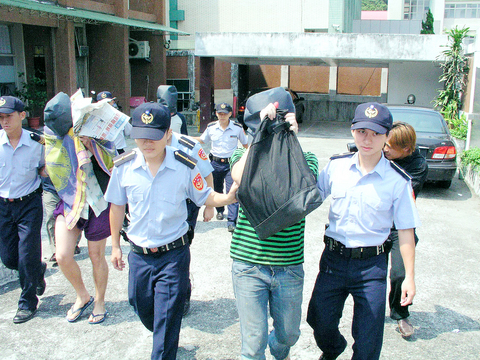The Coast Guard Administration's Keelung mobile-investigation team yesterday arrested an international drug smuggling ring based in Neihu (
Seven other foreign nationals and three Taiwanese Americans were also arrested in connection with the drug ring.
Many of the suspects worked as English-language teachers, the report said.

PHOTO: YANG PEI-HUA, TAIPEI TIMES
The ring smuggled drugs into the country inside textbooks and sold them to foreign students and returning Taiwanese students from overseas in pubs and other night spots, as well as over the Internet.
Members of the Coast Guard Administration were able to bust the drug dealers yesterday after three months of surveillance when they spotted a Taiwanese American man, Su Sheng-hsi (
The coast guard team saw their opportunity and arrested Su.
Then they sent Su back upstairs as bait and managed to arrest the alleged "king pin" of the ring, who they identified as Forand Mathieu James, a Canadian teacher.
Other alleged ring members from Canada, Australia and Hong Kong were also arrested.
James had spent two years in Taiwan working as an English teacher, the CNA report said, adding that in addition to selling many kinds of drugs, he had also collected drug-related books.
The coast guards found 600g of cocaine, some marijuana and hundreds of ecstasy pills on site.
The report said both James and Su were being held in custody for violating drug regulations. The others were released after agreeing to serve as witnesses.
The Coast Guard is currently investigating if there are any more people involved.

NATIONAL SECURITY THREAT: An official said that Guan Guan’s comments had gone beyond the threshold of free speech, as she advocated for the destruction of the ROC China-born media influencer Guan Guan’s (關關) residency permit has been revoked for repeatedly posting pro-China content that threatens national security, the National Immigration Agency said yesterday. Guan Guan has said many controversial things in her videos posted to Douyin (抖音), including “the red flag will soon be painted all over Taiwan” and “Taiwan is an inseparable part of China,” while expressing hope for expedited “reunification.” The agency received multiple reports alleging that Guan Guan had advocated for armed reunification last year. After investigating, the agency last month issued a notice requiring her to appear and account for her actions. Guan Guan appeared as required,

A strong cold air mass is expected to arrive tonight, bringing a change in weather and a drop in temperature, the Central Weather Administration (CWA) said. The coldest time would be early on Thursday morning, with temperatures in some areas dipping as low as 8°C, it said. Daytime highs yesterday were 22°C to 24°C in northern and eastern Taiwan, and about 25°C to 28°C in the central and southern regions, it said. However, nighttime lows would dip to about 15°C to 16°C in central and northern Taiwan as well as the northeast, and 17°C to 19°C elsewhere, it said. Tropical Storm Nokaen, currently

PAPERS, PLEASE: The gang exploited the high value of the passports, selling them at inflated prices to Chinese buyers, who would treat them as ‘invisibility cloaks’ The Yilan District Court has handed four members of a syndicate prison terms ranging from one year and two months to two years and two months for their involvement in a scheme to purchase Taiwanese passports and resell them abroad at a massive markup. A Chinese human smuggling syndicate purchased Taiwanese passports through local criminal networks, exploiting the passports’ visa-free travel privileges to turn a profit of more than 20 times the original price, the court said. Such criminal organizations enable people to impersonate Taiwanese when entering and exiting Taiwan and other countries, undermining social order and the credibility of the nation’s

‘SALAMI-SLICING’: Beijing’s ‘gray zone’ tactics around the Pratas Islands have been slowly intensifying, with the PLA testing Taiwan’s responses and limits, an expert said The Ministry of National Defense yesterday condemned an intrusion by a Chinese drone into the airspace of the Pratas Islands (Dongsha Islands, 東沙群島) as a serious disruption of regional peace. The ministry said it detected the Chinese surveillance and reconnaissance drone entering the southwestern parts of Taiwan’s air defense identification zone early yesterday, and it approached the Pratas Islands at 5:41am. The ministry said it immediately notified the garrison stationed in the area to enhance aerial surveillance and alert levels, and the drone was detected in the islands’ territorial airspace at 5:44am, maintaining an altitude outside the effective range of air-defense weaponry. Following